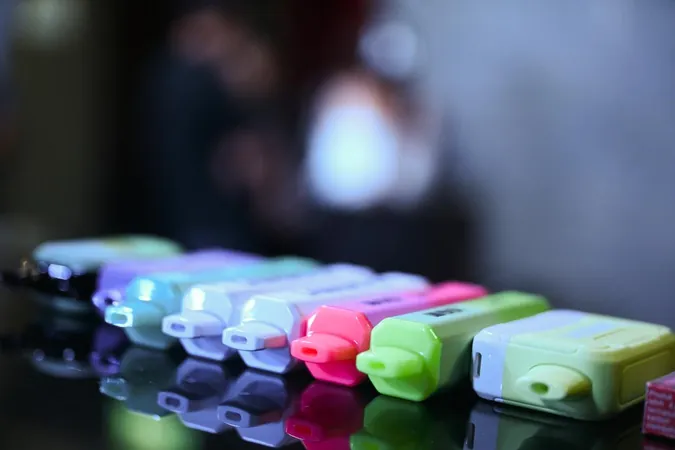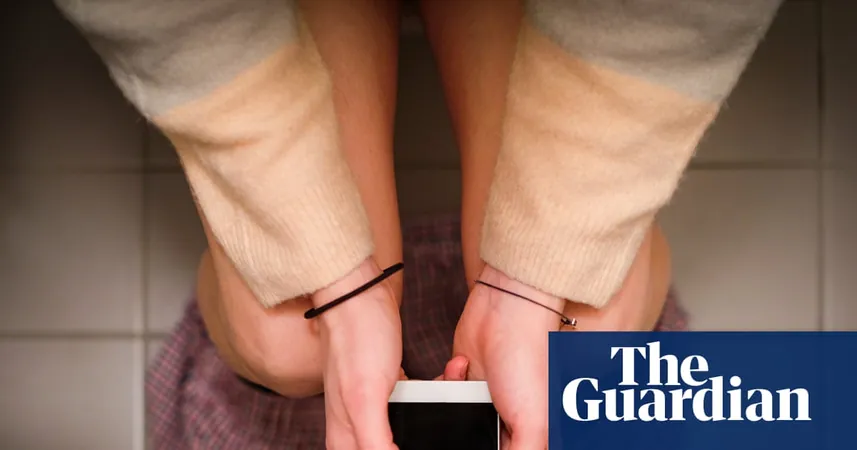
Vape Detectors Spark Controversy: Temasek Polytechnic Targets Student Vaping
2025-08-24
Author: Rajesh
Vape Detectors Unveil Shocking Truth at Temasek Polytechnic
In a bold move to combat the rising tide of vaping among students, Temasek Polytechnic (TP) recently conducted a trial of advanced vape detectors on its campus. The result? Several students were caught in the act of vaping, prompting firm disciplinary measures.
Growing Concerns about Vaping in Schools
With vaping skyrocketing among teens, schools in Singapore and beyond are increasingly turning to innovative technology to tackle the issue. These detectors, which monitor air quality by sensing smoke and aerosol particulates, have piqued interest from various educational institutions.
Pioneering the Fight Against Vaping
TP is currently evaluating the effectiveness of these vape detectors, hoping their insights will aid in broadening their use across schools. A spokesperson mentioned that this initiative is part of a larger strategy to deter vaping on school grounds, which includes enhanced security patrols.
The Global Vaping Crisis
The rise in vaping isn’t confined to Singapore. Countries like the UK and the US are also battling similar challenges, prompting schools to adopt vape detection technology to keep students accountable.
Vape Detector Technology on the Rise
Local companies, including Innotec Solutions, have noticed a surge in inquiries about vape detectors in recent weeks. Their spokesperson, Wilbert Tan, stated, "Schools are now more receptive to using technology as a countermeasure against vaping." With five manufacturers currently in Singapore, the market is heating up.
Halo Smart Sensor: The Future of School Security?
One standout device is the Halo Smart Sensor, a palm-sized gadget costing about $2,000. Designed to detect smoke, vape aerosols, and even loud noises, it can alert staff instantly if tampered with—a potential game-changer for school authorities.
A Call for Action: Experts Weigh In
Ben Chester Cheong, an academic at the Singapore University of Social Sciences, warns that delaying the installation of vape detectors could normalize vaping culture on campuses. His advice? Schools should act decisively to prevent this growing epidemic.
Students Need More Than Surveillance
While some administrators view vape detectors as necessary for policing behavior, others, like N. Sivarajan, principal of Sengkang Secondary, emphasize education and responsible decision-making among students. He highlighted initiatives where student athletes pledge to stay vape-free as part of the school's anti-vaping campaign.
Government Taking a Stand on Vaping
In a recent speech, Prime Minister Lawrence Wong identified vaping as a significant issue. He announced plans for nationwide enforcement and a comprehensive public awareness campaign aimed at schools and national service.
Smart Solutions to a Growing Problem
With a staggering increase from 800 cases in 2022 to 2,000 reported incidents in 2024 involving students caught with vapes, the urgency for action has never been higher. Cheong suggests that active detection can change students’ behavior as swiftly as traffic enforcement does.
Innovative Testing Kits Enter the Fray
In addition to vape detectors, local companies are introducing rapid test kits capable of detecting dangerous substances laced within vapes, allowing schools to screen students quickly and efficiently. These kits, resembling COVID-19 tests, can provide results in minutes.
Moving Forward: A Multi-Faceted Approach Needed
As polytechnics and other institutes ramp up patrols and checks, students are reminded of the hazards of vaping and encouraged to seek help if struggling with addiction. Schools are stepping up their educational efforts, aiming to create a vape-free environment that extends beyond just campus walls.
Final Thoughts: The Battle Against Vaping Continues
As schools grapple with the challenge of vaping, it’s clear that a mix of technology, education, and support is essential in shaping a healthier environment for students. Will the initiatives start paying off, or will vaping continue to pose a threat to student well-being? Only time will tell.



 Brasil (PT)
Brasil (PT)
 Canada (EN)
Canada (EN)
 Chile (ES)
Chile (ES)
 Česko (CS)
Česko (CS)
 대한민국 (KO)
대한민국 (KO)
 España (ES)
España (ES)
 France (FR)
France (FR)
 Hong Kong (EN)
Hong Kong (EN)
 Italia (IT)
Italia (IT)
 日本 (JA)
日本 (JA)
 Magyarország (HU)
Magyarország (HU)
 Norge (NO)
Norge (NO)
 Polska (PL)
Polska (PL)
 Schweiz (DE)
Schweiz (DE)
 Singapore (EN)
Singapore (EN)
 Sverige (SV)
Sverige (SV)
 Suomi (FI)
Suomi (FI)
 Türkiye (TR)
Türkiye (TR)
 الإمارات العربية المتحدة (AR)
الإمارات العربية المتحدة (AR)